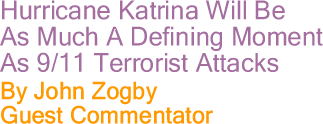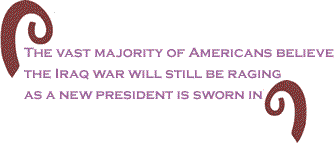
|
|||||||||||||||||||||
|
||||||||||
|
The current issue is always free to everyone If
you need the access available to a |
||||||||||
 |
||||||||||
I have been saying for some time that the top issue in the 2008 presidential campaign is going to be the Iraq war, with the war on terror a clear second. This is not rocket science; our polling has shown this for many months. The vast majority of Americans believe the Iraq war will still be raging as a new president is sworn in. In the shadow of these mammoth international problems are domestic concerns: health care, Social Security reform, the environment. But these issues pale in the face of a widespread sense of real trouble ahead for America. Barely 30 percent think the nation is now headed in the right direction, and 73 percent say the U.S. is in a serious crisis, according to our recent polling. This suggests a need to redefine the very nature and structure of U.S. federalism. In our post-Katrina polling, we found a hunger, nationwide, for a new model for the federal government. In many ways, I believe Katrina, over the long haul, will prove to be more of a defining moment in American history than the terrorist attacks of Sept. 11, 2001. I realize this may be a stunning statement and that I may be a little ahead of the polls on this, because a poll provides us with a snapshot in time. But there is a trend pointing to this conclusion. While sour memories of the post-Katrina failures have dimmed, the hunger for a better government model has not. The implications for the 2008 presidential election are fascinating.
Our polling shows that Sept. 11, 2001 and its aftermath left a majority of Americans resigned to the idea that we will face another major attack on our own soil. It is, to a certain extent, out of our control. Likely because response to that attack required efforts that were largely limited to the several blocks around the World Trade Center and the Pentagon, governmental response was relatively straightforward, and was largely regarded as a success. But Katrina was different. It involved an entire region, and revealed a dramatic structural failure of our system of government. Ultimately, the failures sent a single message to America: the United States is not prepared for a major disaster, natural or otherwise. The feds get the most blame because they are seen as the government solution of last resort. When the governments of New Orleans and Louisiana failed in the run-up to, and aftermath of, the storm, Washington acted more like the error-prone Little Leaguer you try to hide in right field than the superhero swooping in to save the day. And so the 2008 presidential campaign is being waged against a backdrop of national unease over Washington’s competence. With the candidates already pretty well-defined on the dominating issue of the Iraq war, the winner may be the one who best defines a new role for how Washington performs when crisis strikes here at home. Americans want the job done, and done right, and the candidate who successfully outlines a plan for national unity and a marshaling of resources is going to have a decided edge. Our polling shows Americans, faced with a major disaster, don’t want the federal government to solve all their problems by dominating state and local governments with bureaucratic dictates from Washington. Instead, they want a nimble federal government that acts as a clearinghouse, an organizer, a traffic cop for all levels of government and other organizations, including faith-based groups and non-governmental organizations. Even if candidates don’t talk about these concerns, American voters will be judging them based on whether or not they have what it takes to build that kind of national government. In a post-Katrina world, these may well be the defining issues not just of the 2008 presidential election, but of this generation. John Zogby is President and CEO of Zogby International. Audio: John Zogby Comments on Katrina. |
||||||||||
| June
21, 2007 Issue 234 |
|
| Printer Friendly Version in resizeable plain text format |
 |
 |
 |
| |
| |


































